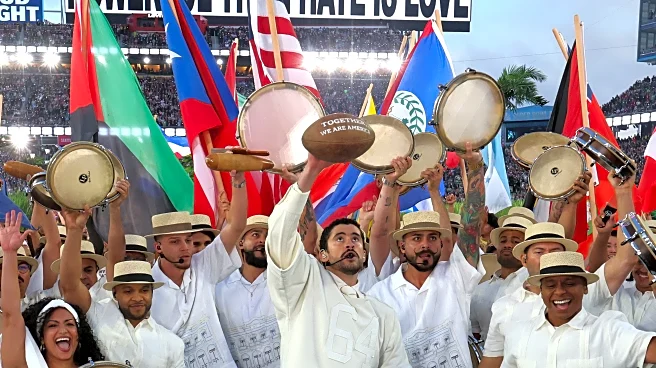What's Happening?
The U.S. Supreme Court is reviewing a case involving GEO Group, Inc., a private prison contractor, which is seeking to appeal a lower court's decision regarding $1-a-day wages paid to immigrant detainees
at a federal detention center. The case, GEO Group, Inc. v. Menocal, centers on whether GEO can claim immunity from lawsuits under the collateral-order doctrine, a legal principle that allows certain appeals before a final judgment. GEO Group argues that as a government contractor, it should be immune from litigation, citing the Yearsley doctrine, which protects contractors acting under government direction. The lawsuit, initiated by former detainee Alejandro Menocal, alleges forced labor and unjust enrichment, claiming detainees were paid as little as $1 per day for voluntary work at GEO's Aurora, Colorado facility.
Why It's Important?
The Supreme Court's decision in this case could have significant implications for the accountability of government contractors and the oversight of privately run government programs. If GEO Group is granted immunity, it may set a precedent that could limit the ability of individuals to hold contractors accountable for labor practices. This case also highlights broader issues of labor rights and the treatment of immigrant detainees, raising questions about the fairness and dignity of paying detainees minimal wages for work performed. The outcome could influence future contracts and the willingness of private firms to engage in government work, potentially affecting the operations of detention centers and similar facilities across the U.S.
What's Next?
The Supreme Court is expected to issue a ruling later this term, which will determine whether GEO Group can appeal the lower court's decision immediately. This ruling will clarify the application of the Yearsley doctrine and the collateral-order doctrine in cases involving government contractors. Depending on the outcome, there may be further legal challenges or adjustments to policies governing the wages and working conditions of detainees in federal facilities.
Beyond the Headlines
The case underscores ethical concerns about the treatment of detainees and the role of private contractors in government operations. It raises questions about the balance between cost-saving measures and human rights, as well as the legal frameworks that protect or expose contractors to litigation. The decision could prompt discussions on the need for reform in detention center operations and the standards for detainee labor programs.










